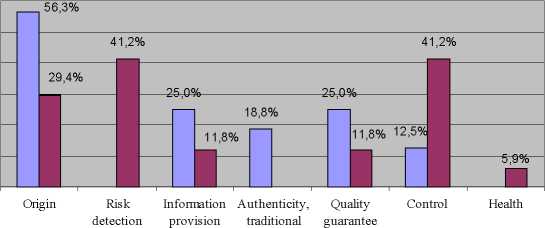own quality label. The willingness to pay for a quality and origin label depends on
the kind of product. For instance they would pay a higher price in case of fresh or
daily products rather than in case of pasta, honey or tinned products. Becker
affirmed that a higher confidence on a quality cue increases the willingness to pay
for it. Therefore, it is a key aspect to inform consumer about quality differences on
products as long as it provides them certain confidence.
4.4. Definition of traceability
Up- to- date, there are many concepts defining traceability. According to the EC
General Food Law Regulation 178/2002, traceability is the ability to trace and track
a food, feed food producing animals, and any other substance intended to be, or
expected to be, incorporated into a food or feed through all stages of production,
processing and distribution. From technicians’ position, traceability is the
possibility to dispose on the history, use and localization of one entity through
registered identification (ISO 8402), whereas industrial point of view is more related
to the ability to identify rapidly, in case of any problem, the different suspected lots
as well as the responsible persons. However, the main issue for us is the consumer
and hence, it leads us to get a deeper understanding of his/her perception and
expectances concerning traceability.
During focus groups many terms aroused when we asked for a definition on
traceability. Generally, participants of both countries had a good knowledge of
meaning of traceability and in case of not having ever heard about it, could
satisfactorily infer its meaning. Italians perceive traceability mainly as adequate to
guarantee origin and authenticity of traditional products. It is believed to be a good
information provision system to assess quality of food products. Expected benefits
from a well- traced product are the possibility to have more information and in
general the participants have not confidence that the companies will react quickly
in case of need.
In Spain, terms such as origin, location, control and pursuit of the product were
mostly mentioned in relation to traceability but, as difference of Italian perception,
Spanish refer to traceability as a health and food safety guarantee, mainly valuable
to avoid food risks. Generally, it is conceived as a tool which facilitates to know
accurately the origin of products and helps to distinguish non- conventional
products, i.e. those produced by means of new production systems, from
conventional; and provide information of the origin. The main attached benefits are
mainly food safety, secondly, awareness of location of the food products and
finally, a better capacity of reaction in case of a food scare. Moreover, participants
were aware of the benefits, that traceability generates for the food industry as an
instrument to control their own products and as a marketing strategy to protect
their image. In the following figure, it is shown some concepts attached to
perception of traceability by participants in relation to the percentage of quotations
found in the transcripts of focus groups session.

□ Italy □ Spain
11
More intriguing information
1. Towards Teaching a Robot to Count Objects2. GENE EXPRESSION AND ITS DISCONTENTS Developmental disorders as dysfunctions of epigenetic cognition
3. The name is absent
4. ENVIRONMENTAL POLICY: THE LEGISLATIVE AND REGULATORY AGENDA
5. The Trade Effects of MERCOSUR and The Andean Community on U.S. Cotton Exports to CBI countries
6. The name is absent
7. A NEW PERSPECTIVE ON UNDERINVESTMENT IN AGRICULTURAL R&D
8. The name is absent
9. A Rational Analysis of Alternating Search and Reflection Strategies in Problem Solving
10. The name is absent